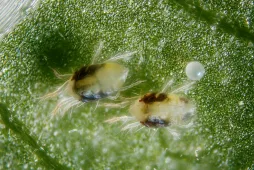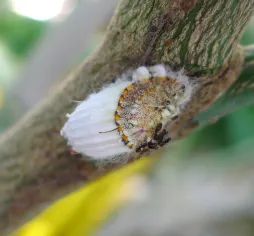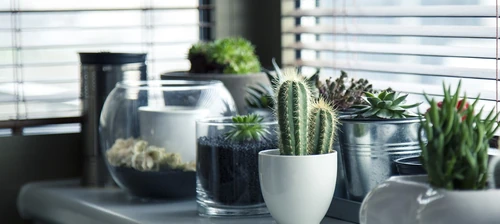Alocasia micholitziana, an alocasia with velvety leaves
In 1912, Mr. Sander won the Royal Horticultural Exhibition's first botanical prize in the "New Plant" category by presenting an Alocasia micholitziana, a plant of the Araceae family native to the Philippines. Although this variety is no longer a novelty, it remains rare, and its velvety leaves are always a hit.
How to recognize Alocasia micholitziana?
Alocasia micholitziana is a tuberous perennial. With its bushy habit, it doesn't exceed 50 centimetres in height and the same span.
The plant has long petioles (up to 45 centimetres). Green, they may be speckled with brown, red or purple.
Each plant has four to seven leaves. The velvety, sagittate blades have wavy margins. Their underside is pale green and plain. The upper surface is a deep, matte green enhanced by broad white veins. In recent years, botanists have developed cultivars variegated with white, yellow or mint green. Sold under the name Alocasia micholitziana 'Frydek' variegata, they are particularly rare and in demand!
Alocasia micholitziana blooms in summer. Its greenish spathe contains a creamy spadix.
Alocasias are toxic to animals and humans. Their sap contains alkaloids and calcium oxalate, two harmful substances. They cause intestinal, kidney and respiratory disorders when ingested. They can also cause skin and mucous membrane irritation.
Our maintenance tips
Alocasia 'Green Velvet are not plants to be placed in everyone's hands. They need light, rich soil, a little knowledge and a lot of attention.
Watering
Keep the soil in your Alocasia 'Green Velvet always fresh. When the substrate is one to two centimeters dry, you can water.
Use room-temperature, non-calcareous water. What's best? Recovered rainwater. If you don't have any, you can use filtered water. You can also use tap water, provided you let it stand for a while.
After watering, empty the water stagnating at the bottom of the dish. It may rot the roots.
Spray
If the air in your home is dry, spray the leaves of your plant with non-calcareous water at room temperature.
Repotting
In spring, transfer your Alocasia micholitziana to a larger pot, so that it can continue to grow.
Choose a pierced pot slightly larger than the previous one. It's best to opt for a clay model: this material promotes even drying of the soil.
Line the bottom with a bed of gravel or clay balls. Add a layer of potting soil with perlite or sand. For example, you can mix potting soil for green plants with sand. Place your subject in the center and fill in with substrate to within a couple of centimeters of the edge. Tamp down and water for the first time to encourage rooting.
Fertilization
You can stimulate the development of your plant during its growth phase, in spring and summer, with fertilizer.
Apply liquid green plant fertilizer diluted with water.
Cleaning
The leaves of your Alocasia 'Green Velvet accumulate dust. It interferes with photosynthesis and encourages the appearance of parasites. Clean them with a clean, damp sponge.
Remember that alocasia 'Green Velvet is toxic. Wear gloves when dusting.
Cutting
Cutting is carried out during the strong growth phase, generally in spring and early summer.
Using your hands or a clean, sharp tool, separate one of the shoots that has formed at the base of the plant. Choose a young shoot with roots.
Prepare buckets with potting soil similar to that used for adult plants. Translucent pots are best. You'll be able to monitor root growth.
Place the bulbils on the surface, flat side down and pointed side up. Water and then place your bulbils in a greenhouse or transparent crate.
Diseases / Threats
Information
| Family | Araceae - Araceae |
| Type | Alocasia - Alocasia |
| Species | Alocasia micholitziana - Alocasia micholitziana |
| Lifecycle | Perennial |
| Foliage | Evergreen |
| Exposure | |
| Substrat | |
| Planting methods |
In pots In tubs |
| Categories | |
| Tags |
Fritillary Soiffarde Toxic |
| Origin |
Southeast Asia |
| Hardiness (USDA) | 11a |
| Leaf color |
|
| Flower colors |
|
Discover plants from the same family
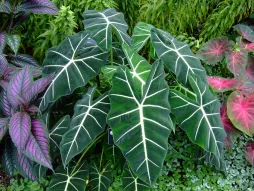
Alocasia Frydek
Discover
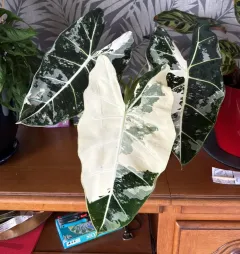
Alocasia 'Frydek Variegata'
Discover
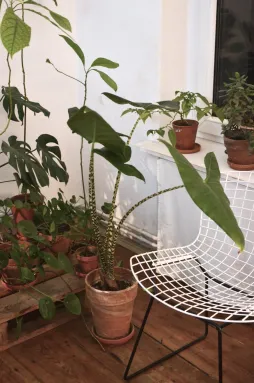
Alocasia zebrina
Discover
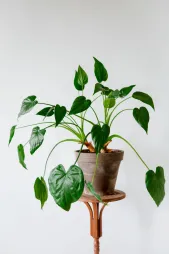
Alocasia cucullata
Discover












